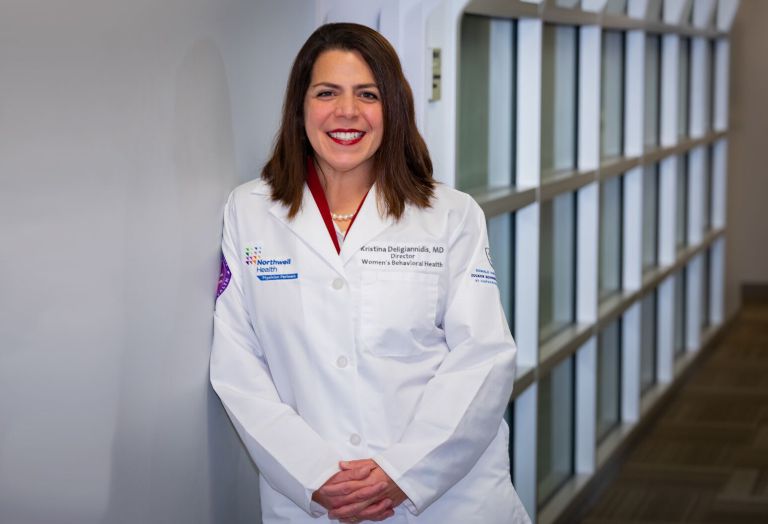
In a pivotal decision, the U.S. Food and Drug Administration has granted approval for the first at-home oral pill to relieve postpartum depression after decades of preclinical research nationwide and the leadership role played by a doctor at Northwell Health.
The medication, zuranolone, is aimed at mitigating perinatal or postpartum depression, a condition known as PPD afflicting approximately one in eight women and the most common complication of childbirth.
Dr. Kristina M. Deligiannidis, a professor at the Institute of Behavioral Science at Northwell Health’s Feinstein Institutes for Medical Research in Manhasset, is a key contributor to the development of the pill. She is also director of women’s behavioral health at Northwell’s Zucker Hillside Hospital.
Deligiannidis said the commitment to continue researching and the collaboration effort with scientists across the nation helped make the pill a possibility.
“Years of dedicated research and collaborative endeavors with fellow scientists nationwide have culminated in an innovative, easily accessible treatment avenue for women confronting postpartum and perinatal depression,” she said.
“This momentous FDA decision has the potential to reverse the trend of underdiagnosed and undertreated PPD, promising assistance to a larger cohort of women in dire need.”
The pill is expected to launch as soon as October. It is prescribed to be taken once a day for two weeks.
Shortly following the conclusion of the SKYLARK Study’s phase 3 clinical trials assessing zuranolone, findings were published with Deligiannidis as lead author in The American Journal of Psychiatry on July 26.
The results showed significant relief after three days of treatment, merely after two doses, and this progress continued until the trial’s conclusion on day 45.
“Postpartum depression is underrecognized, undertreated and disruptive for those who live with the condition. We collaborate with researchers around the world in an effort to develop more rapid and effective therapies for the many women who need support,” said Deligiannidis in a press release from July after reaching phase 3 in clinical trials.
Results found that 57% of the women administered zuranolone showed a notable improvement of 50% or more in their depressive symptoms by day 15, as opposed to 38% of those who were given a placebo. At day 45, 61.9% of participants receiving zuranolone experienced a 50% or more improvement for their depressive symptoms compared to the 54.1% of women receiving a placebo.
The most prevalent treatment-related side effects, observed in over 5% of participants in the zuranolone 50 mg group, were drowsiness, dizziness, sedation, headache, diarrhea, nausea, urinary tract infection, and Covid-19.
“Dr. Deligiannidis is a leader in clinical trials for postpartum depression, a condition that affects millions,” said Dr. Kevin J. Tracey, president and CEO of the Feinstein Institutes, Karches Family Distinguished Chair in Medical Research. “The FDA approval stemming from her work will make available new therapeutic options that are clearly needed.”
According to a recent study by the Centers for Disease Control and Prevention, the rate of diagnosing depression at the time of delivery was found to be sevenfold higher in 2015 than in 2000.
The Feinstein Institutes and Deligiannidis have received more than $4 million in multi-year grants to use non-invasive brain imaging to study how perinatal depression develops in women and to develop novel treatments, including bright light therapy, sleep modification and non-invasive vagus nerve stimulation to treat major depressive disorders.
Back in 2019, the FDA granted approval to brexanolone, marking it as the inaugural drug exclusively designated for postpartum depression treatment. This product, produced by Sage Therapeutics and marketed as Zulresso, has seen limited use because it costs $34,000 per dose and requires infusion lasting 60 hours within a hospital setting.
Sage Therapeutics and Biogen Inc. are also producing zuranoloneso, but so far do not have a price for the postpartum depression pill.






